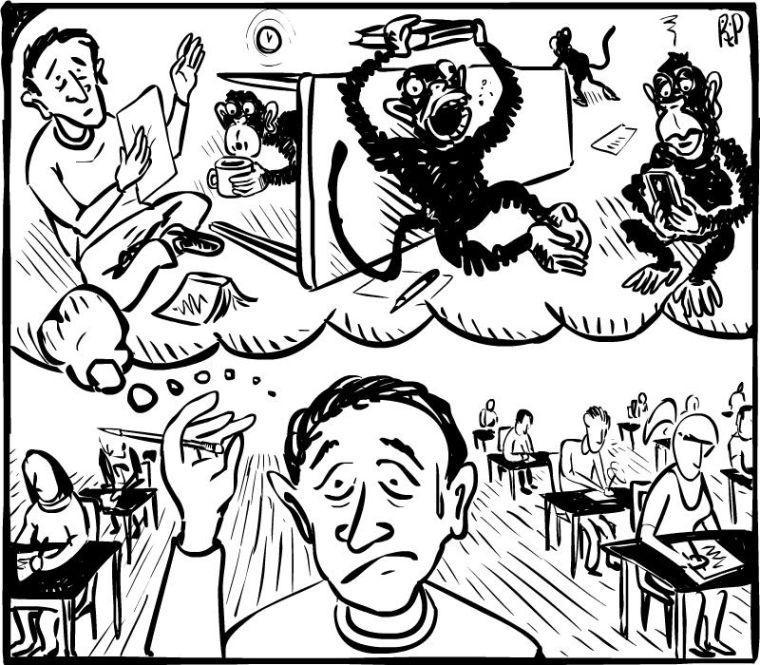With the semester heating up and a first round of tests imminent, many students will turn to study groups hoping to boost their grades. Unfortunately for them, a new experiment shows social distractions from working in groups can lower your IQ and seriously hurt struggling members as their overachieving friends leave them behind.
The experiment, conducted by the Virginia Tech Carilion Research Institute, shows the social effort required to work with a group can lower members’ IQs.
Researchers administered an IQ test to participants and then divided them into groups of five, making sure each group had an equal IQ distribution. Subjects were given a set of ranked problem-solving tasks to complete, and their scores on these tasks were revealed to the group.
Across the board, subjects initially scored lower on the group problems than their baseline IQ tests, but individual scores varied significantly as the experiment progressed and scores were broadcast to the group.
Experimenters noticed some subjects reacted well in the group setting, overtaking their peers, while others became perennial underachievers.
A sample of the subjects had their brains scanned using a functional magnetic resonance imaging (fMRI) machine, which measured the blood flow in different areas of the subjects’ brains.
All of the scanned subjects experienced an initial increase in activity in the amygdala, which is associated with emotions, and a decrease in blood flow to the prefontal cortex, which is the region associated with problem solving.
This shift in brain activity suggests the brain must sacrifice some problem-solving ability to deal with the social and emotional cues necessary for group interaction.
As the experiment progressed, researchers noted a decrease in amygdala activity and a corresponding increase in prefrontal cortex activity, but only among each group’s high achievers.
High achievers also showed increased activity in regions associated with learning and response to rewards and pleasure.
Low achievers experienced an inverse effect. Amygdala activity increased while blood flow in the prefrontal cortex diminished, resulting in a reduction in problem-solving ability.
This reduction was dramatic in some subjects compared to the relatively modest gains of the high-achievers who never surpassed their initial IQ baseline.
These results suggest high achievers were better able to manage their emotions, continue solving problems and enjoyed being ranked on top. Underachievers seem to have spent more of their energy managing their emotions and possibly worrying about their position in the group.
Experimenters noticed no meaningful correlation between age or ethnicity and brain response, but significantly more women (10 of 13) fell into the under-performing group while significantly fewer women (3 of 13) reached the high-performing group.
While the sample was relatively small — only 27 of the 70 subjects were scanned — these results suggest women in general spend more of their energy managing social responses in group settings than men.
Researchers point out these results could be useful in assessing small-group situations such as juries or collective bargaining sessions, but they seem even more applicable to study groups.
Jury members are not given scores on their intelligence during a trial, but students are graded throughout the semester and are frequently compared to their peers.
Broadcasting scores in the experiment accelerated social processes by quickly revealing the most adept group members, but the experiment is directly analogous to a study group of over- and underachievers.
Feedback in the form of grades could push students into over- or underachieving feedback loops as the students at the top of the class have their confidence reinforced while their peers at the bottom lose their nerve.
Pursuing variations of this experiment could provide even more insight into small-group dynamics.
It would be interesting to see how the initial relationships among group members affected their initial drop in IQ and the eventual emergence of the high and low achievers.
The initial experiment involved strangers, but acquaintances, coworkers or close friends could potentially have dramatically different results since they could spend more or less time managing their social dynamics depending on their relationships.
In the meantime, be careful in study groups. They might hurt more than help — especially for struggling students.
Andrew Shockey is a 21-year-old biological engineering junior from Baton Rouge. Follow him on Twitter @TDR_Ashockey.
____
Contact Andrew Shockey at ashockey@lsureveille.com
Shockingly Simple: Working in groups could be hazardous for IQ
February 2, 2012





